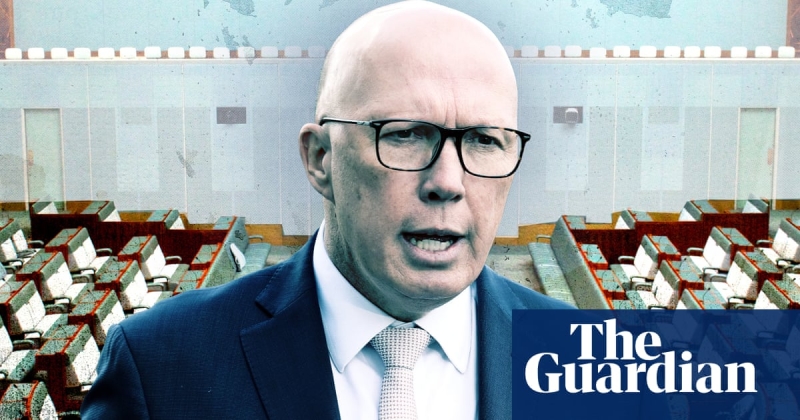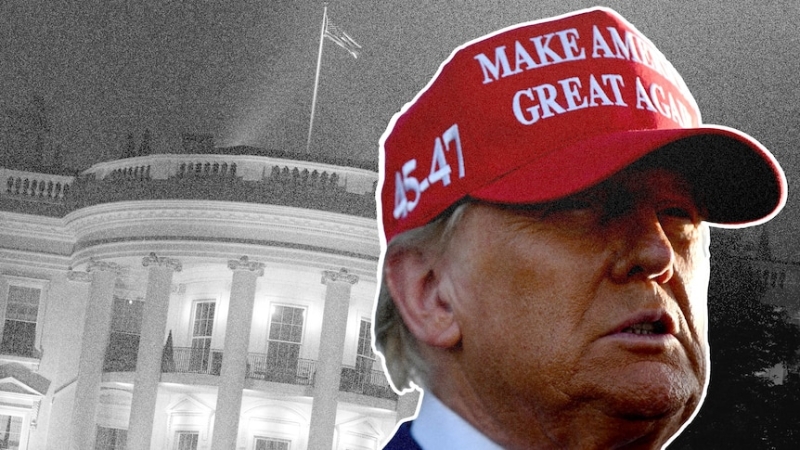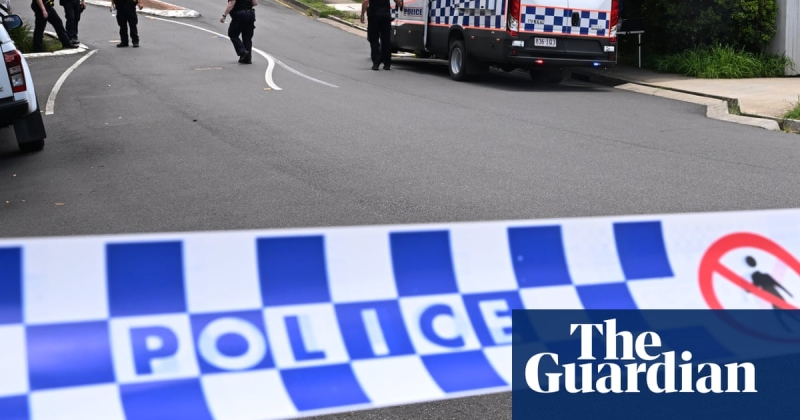The conservative Coalition leader wants to portray the Labor government as out of touch with its traditional working-class base
Peter Dutton, the oft-described “strongman” leader of Australia’s conservative opposition, is no stranger to stoking the flames of culture wars.
It’s a strategy advisers and campaigners will be watching closely as Anthony Albanese’s team digs down on “absolute message discipline” in the lead up to the federal election.
Fresh off US president-elect Donald Trump’s win in November, pundits have a close eye on how Australia’s major parties will play the game of narrative control.
The opposition leader’s foray this week into culture war debates over Australia Day – well-trodden territory for the veteran Liberal – is a likely indication of how the next few months will play out.
With 26 January fast approaching, the former Queensland cop turned property investor and politician used his airtime to bait Albanese.
Asked whether local councils should be left to make their own decisions about holding citizenship ceremonies on Australia Day, Dutton suggested the prime minister re-introduce a Coalition-era directive giving them no other choice.
“If the prime minister doesn’t have the strength of leadership to stand up to mayors and to others who don’t want to celebrate Australia Day,” Dutton told a press pack in Ipswich, south-west of Brisbane, “then our country’s in more trouble than we first realised”.
The city covers three federal seats – Oxley, Blair and Wright. The Coalition hold just one of those seats but will be hoping to make it at least two as part of its plan to win over the outer suburbs and regional centres of Australia.
And central to securing support for the Coalition in these outer-suburban electorates around the country – many of which were once, or are still, considered Labor strongholds – is convincing voters that the workers’ party no longer represents them, Dean Sherr, a former media adviser in the prime minister’s office believes.
Sherr told Guardian Australia that Dutton’s attempts to steer the national conversation into culture war territory are designed to make Labor appear more concerned with socially progressive issues rather than the cost of living.
“[Dutton] wants to create this culture war debate because he thinks it’ll help him win seats in outer-suburban areas and convince people to think Labor’s focus is on inner-city progressive concerns,” Sherr said.
Yaron Finkelstein, once chief political strategist to former prime minister Scott Morrison, agreed it’s a strategy designed to put the government’s campaign messaging off balance.
“Wading into anything that isn’t core policy or core issues for voters at the moment is fraught with danger,” he said.
“It’s less of a problem for the opposition because they’re reminding people of values, and whether the government shares those values or not. So it’s slightly asymmetrical in that way.”
In the midst of economic downturns after the global pandemic, sitting governments around the world have faced a backlash at the polls from voters feeling the brunt of rising costs.
Australia’s own economic circumstances, coupled with the steadily declining primary votes for major parties over consecutive elections, make Labor’s pathway to a second term an uphill battle.
But a government source familiar with Labor’s re-election campaign plans said disciplined messaging – particularly on what the government has done in its first term – was central to its plan to show voters the Coalition’s “hot air” won’t leave them better off.
“[The opposition] don’t know how to do anything else other than just to attack all the time. That’s actually to their detriment, because that is the last thing that Australians want right now,” they said.
Albanese’s response this week to Dutton’s provocation over Australia Day was an example of that in play. Instead of generating a reactive grab for the hungry news cycle, the prime minister invited Dutton to join him for national Australia Day celebrations in Canberra.
Andrew Hughes, a marketing expert at the Australian National University, said that, so far, Albanese’s responses in avoiding the traps set by the Coalition were “smart” but needed consistency.
He described the culture war strategy – as seen in Trump’s successful campaign in the US against the Democrat’s presidential hopeful, Kamala Harris – as a “narrative vortex”. Once a candidate is sucked in, it was tough to get out.
“It’s all about who has control of that day’s narrative, who’s making the stories, and who’s controlling the direction of the campaign,” Hughes said.
The challenge in a government’s re-election also lies in successfully convincing voters of the achievements it has delivered and the allure of attractive promises, Kos Samaras, a former Victorian Labor campaign director turned pollster said.
Labor’s cost-of-living measures since being elected in 2022 have included energy bill relief, and a renovation of the Coalition’s stage-three tax cuts to benefit lower and middle-income earners.
Samaras said while the Albanese government had delivered on some cost-of-living measures, voters he had polled weren’t always convinced of the positive impact it had on their lives.
“It’s very hard for the Labor camp to actually convince people they’ve done the work [in government],” he said.
“They can repeat it over and over again, but the lived experience is one of ‘my life has degraded since 2022’.”
But Samaras said Dutton’s focus on making the Liberal party – long considered the party of business – appeal to working-class and aspirational voters wasn’t an easy avenue.
The Coalition’s plans to alleviate the cost-of-living crisis have been scant on details. Pledges announced include reversing around $100bn in unspecified Labor spending and removing “regulatory roadblocks”.
Dutton’s shadow ministry has also promised a government-owned nuclear industry to replace Labor’s renewable energy plan.
In part, Trump’s 2024 victory in the US centred on convincing working and lower-middle class voters he would offer them better economic outcomes than the Biden administration.
While the strategy worked for Trump, Samaras said a pro-working class Liberal party was a harder sell in Australia.
“Most voters still think that the Liberal party is the party of big business – the establishment. Trump’s entire mantra was anti-establishment,” Samaras said.
“They just can’t undo decades of brand development in that space.”
Finkelstein also conceded the opposition’s culture-war strategy to win over outer-suburban and regional voters had its limitations.
The Liberal strategist said there was an “opportunity cost” for the Coalition if it only focused on culture issues over “the things that really matter”.
“The opposition would be smart enough to know that they can’t make that the main game to win votes.”





